Air Transport: Economic Regulation, Policy, and Pandemic Impact
VerifiedAdded on 2023/06/12
|10
|3585
|242
Report
AI Summary
This report provides a comprehensive analysis of the air transport industry, focusing on economic regulations and policies affecting international airline businesses between 2015 and 2019. It delves into key issues such as consumer protection, fair competition, and environmental concerns, highlighting the challenges of creating a uniform global regulatory framework. The report further examines the unprecedented impact of the COVID-19 pandemic on the aviation sector, detailing the travel restrictions, decreased passenger demand, and financial difficulties faced by airlines and airports. It also addresses the industry's initial responses, including cost-cutting measures and the pursuit of sustainable solutions, as the industry starts to recover by focusing on liquidity, government concessions, and environmental commitments. Desklib offers this report as part of its extensive collection of academic resources, providing students with valuable insights and solved assignments.
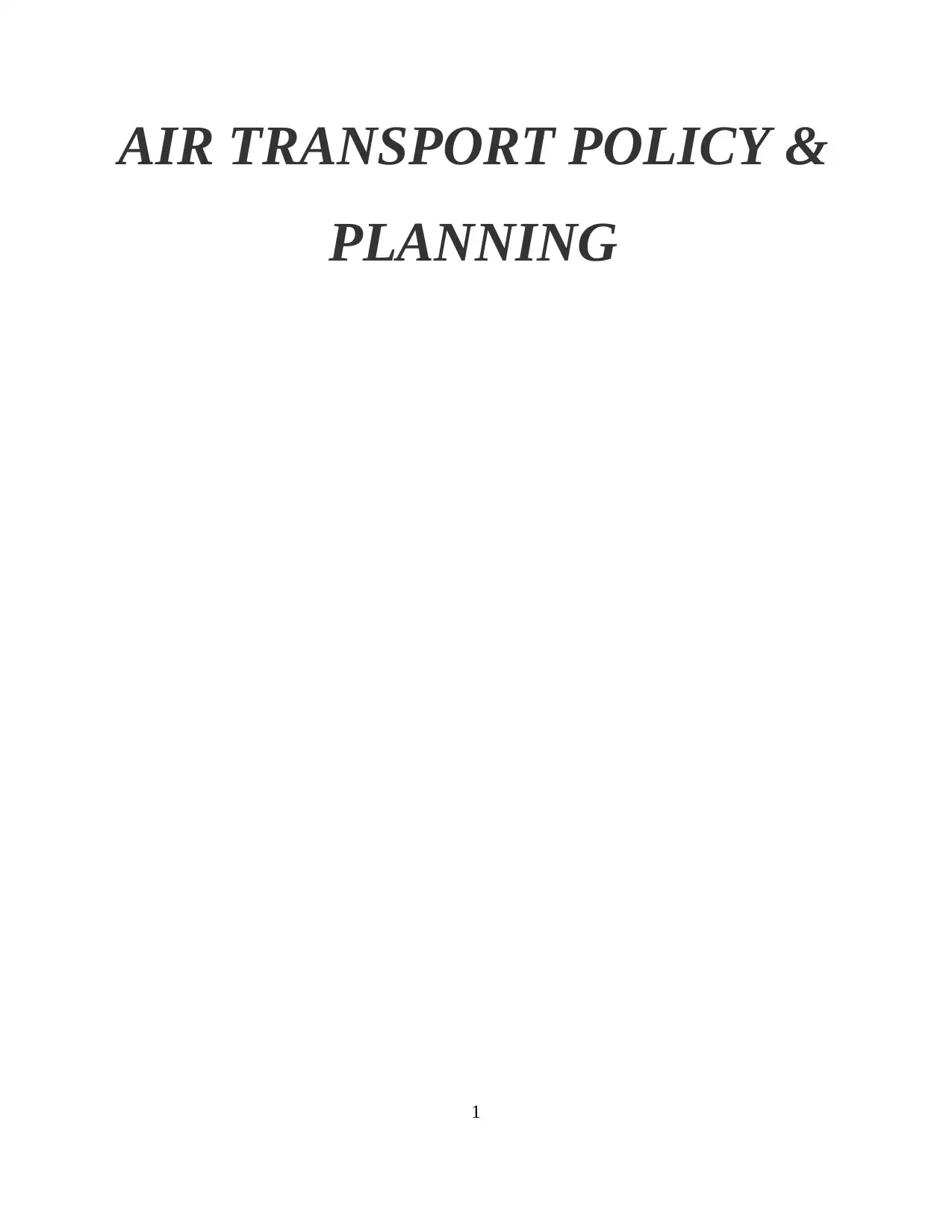
AIR TRANSPORT POLICY &
PLANNING
1
PLANNING
1
Paraphrase This Document
Need a fresh take? Get an instant paraphrase of this document with our AI Paraphraser
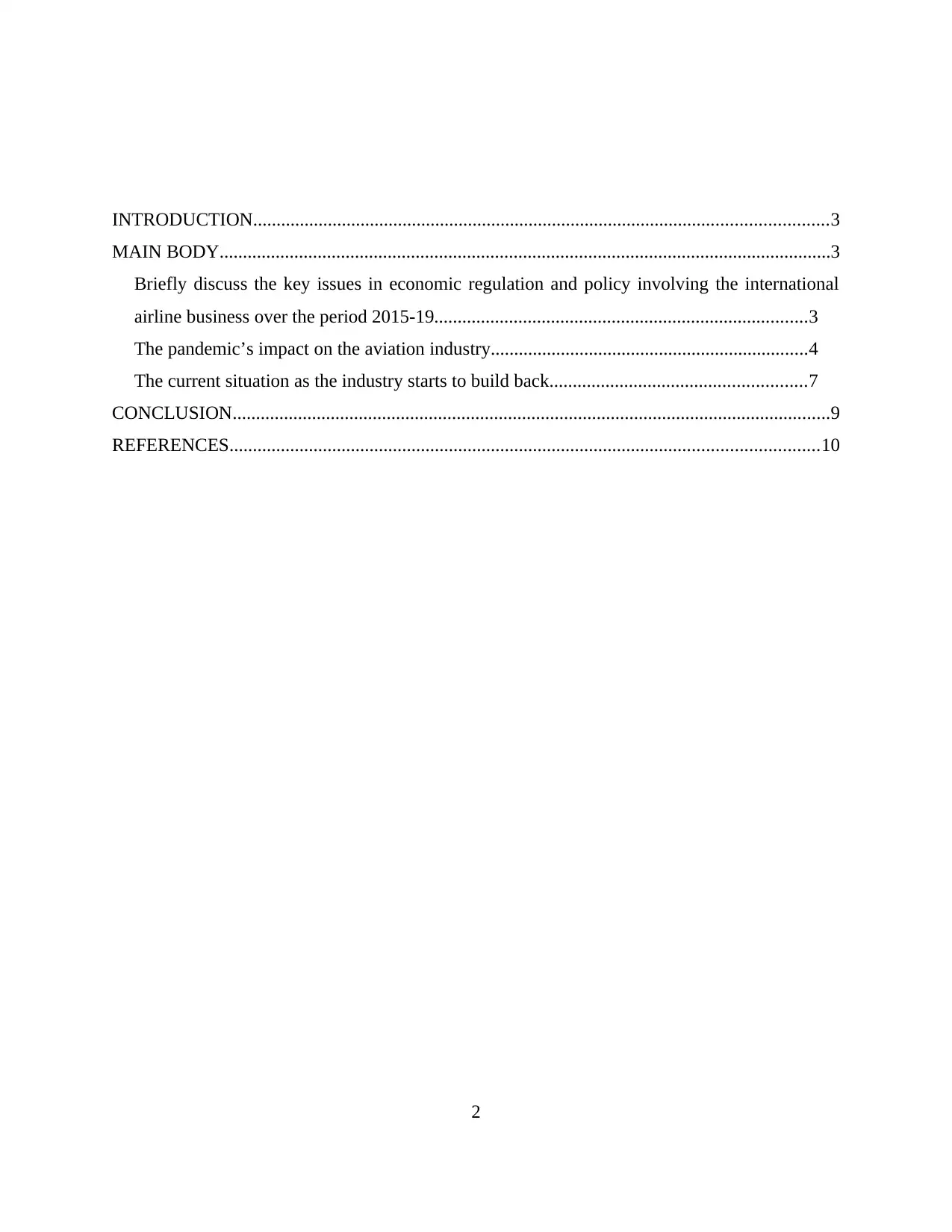
INTRODUCTION...........................................................................................................................3
MAIN BODY...................................................................................................................................3
Briefly discuss the key issues in economic regulation and policy involving the international
airline business over the period 2015-19................................................................................3
The pandemic’s impact on the aviation industry....................................................................4
The current situation as the industry starts to build back.......................................................7
CONCLUSION................................................................................................................................9
REFERENCES..............................................................................................................................10
2
MAIN BODY...................................................................................................................................3
Briefly discuss the key issues in economic regulation and policy involving the international
airline business over the period 2015-19................................................................................3
The pandemic’s impact on the aviation industry....................................................................4
The current situation as the industry starts to build back.......................................................7
CONCLUSION................................................................................................................................9
REFERENCES..............................................................................................................................10
2
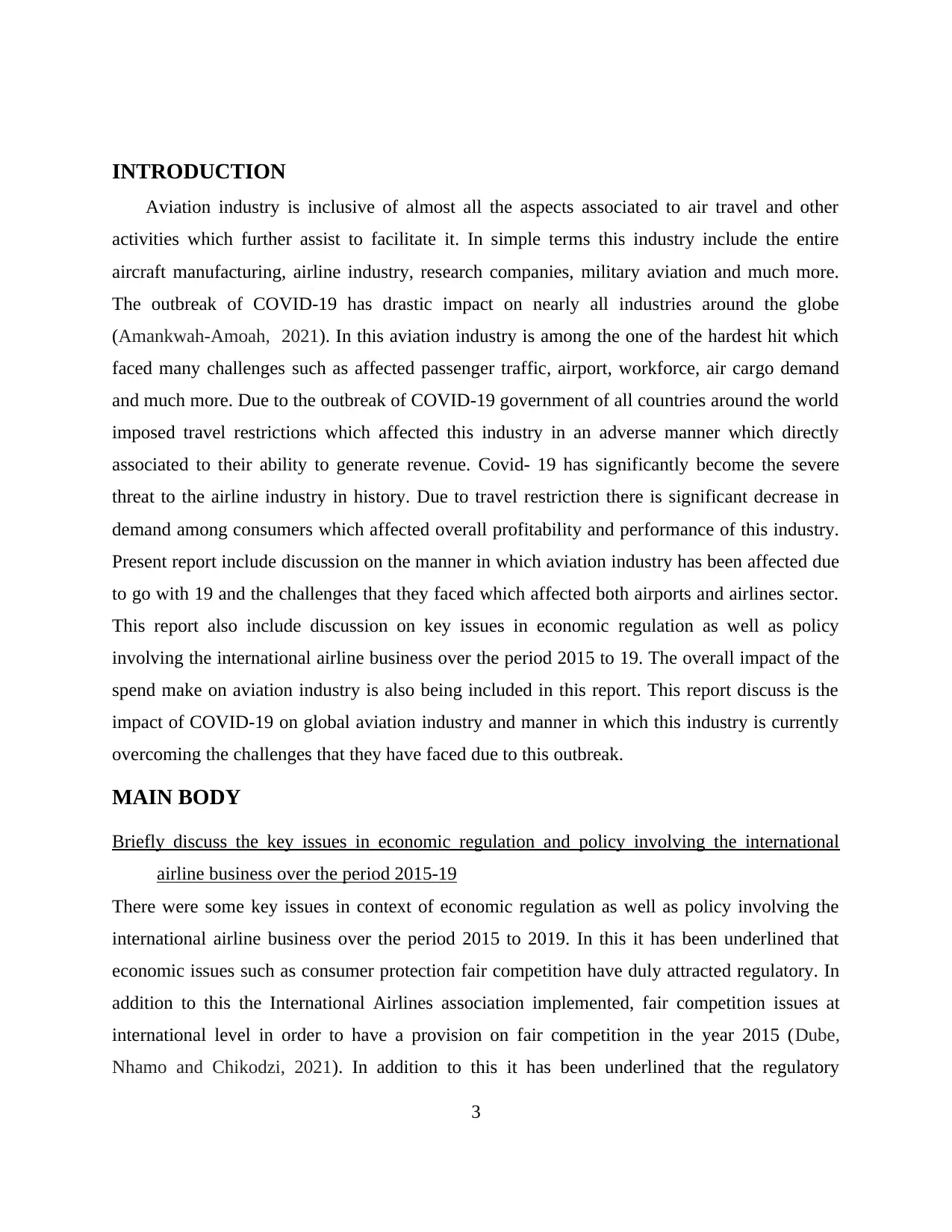
INTRODUCTION
Aviation industry is inclusive of almost all the aspects associated to air travel and other
activities which further assist to facilitate it. In simple terms this industry include the entire
aircraft manufacturing, airline industry, research companies, military aviation and much more.
The outbreak of COVID-19 has drastic impact on nearly all industries around the globe
(Amankwah-Amoah, 2021). In this aviation industry is among the one of the hardest hit which
faced many challenges such as affected passenger traffic, airport, workforce, air cargo demand
and much more. Due to the outbreak of COVID-19 government of all countries around the world
imposed travel restrictions which affected this industry in an adverse manner which directly
associated to their ability to generate revenue. Covid- 19 has significantly become the severe
threat to the airline industry in history. Due to travel restriction there is significant decrease in
demand among consumers which affected overall profitability and performance of this industry.
Present report include discussion on the manner in which aviation industry has been affected due
to go with 19 and the challenges that they faced which affected both airports and airlines sector.
This report also include discussion on key issues in economic regulation as well as policy
involving the international airline business over the period 2015 to 19. The overall impact of the
spend make on aviation industry is also being included in this report. This report discuss is the
impact of COVID-19 on global aviation industry and manner in which this industry is currently
overcoming the challenges that they have faced due to this outbreak.
MAIN BODY
Briefly discuss the key issues in economic regulation and policy involving the international
airline business over the period 2015-19
There were some key issues in context of economic regulation as well as policy involving the
international airline business over the period 2015 to 2019. In this it has been underlined that
economic issues such as consumer protection fair competition have duly attracted regulatory. In
addition to this the International Airlines association implemented, fair competition issues at
international level in order to have a provision on fair competition in the year 2015 (Dube,
Nhamo and Chikodzi, 2021). In addition to this it has been underlined that the regulatory
3
Aviation industry is inclusive of almost all the aspects associated to air travel and other
activities which further assist to facilitate it. In simple terms this industry include the entire
aircraft manufacturing, airline industry, research companies, military aviation and much more.
The outbreak of COVID-19 has drastic impact on nearly all industries around the globe
(Amankwah-Amoah, 2021). In this aviation industry is among the one of the hardest hit which
faced many challenges such as affected passenger traffic, airport, workforce, air cargo demand
and much more. Due to the outbreak of COVID-19 government of all countries around the world
imposed travel restrictions which affected this industry in an adverse manner which directly
associated to their ability to generate revenue. Covid- 19 has significantly become the severe
threat to the airline industry in history. Due to travel restriction there is significant decrease in
demand among consumers which affected overall profitability and performance of this industry.
Present report include discussion on the manner in which aviation industry has been affected due
to go with 19 and the challenges that they faced which affected both airports and airlines sector.
This report also include discussion on key issues in economic regulation as well as policy
involving the international airline business over the period 2015 to 19. The overall impact of the
spend make on aviation industry is also being included in this report. This report discuss is the
impact of COVID-19 on global aviation industry and manner in which this industry is currently
overcoming the challenges that they have faced due to this outbreak.
MAIN BODY
Briefly discuss the key issues in economic regulation and policy involving the international
airline business over the period 2015-19
There were some key issues in context of economic regulation as well as policy involving the
international airline business over the period 2015 to 2019. In this it has been underlined that
economic issues such as consumer protection fair competition have duly attracted regulatory. In
addition to this the International Airlines association implemented, fair competition issues at
international level in order to have a provision on fair competition in the year 2015 (Dube,
Nhamo and Chikodzi, 2021). In addition to this it has been underlined that the regulatory
3
⊘ This is a preview!⊘
Do you want full access?
Subscribe today to unlock all pages.

Trusted by 1+ million students worldwide
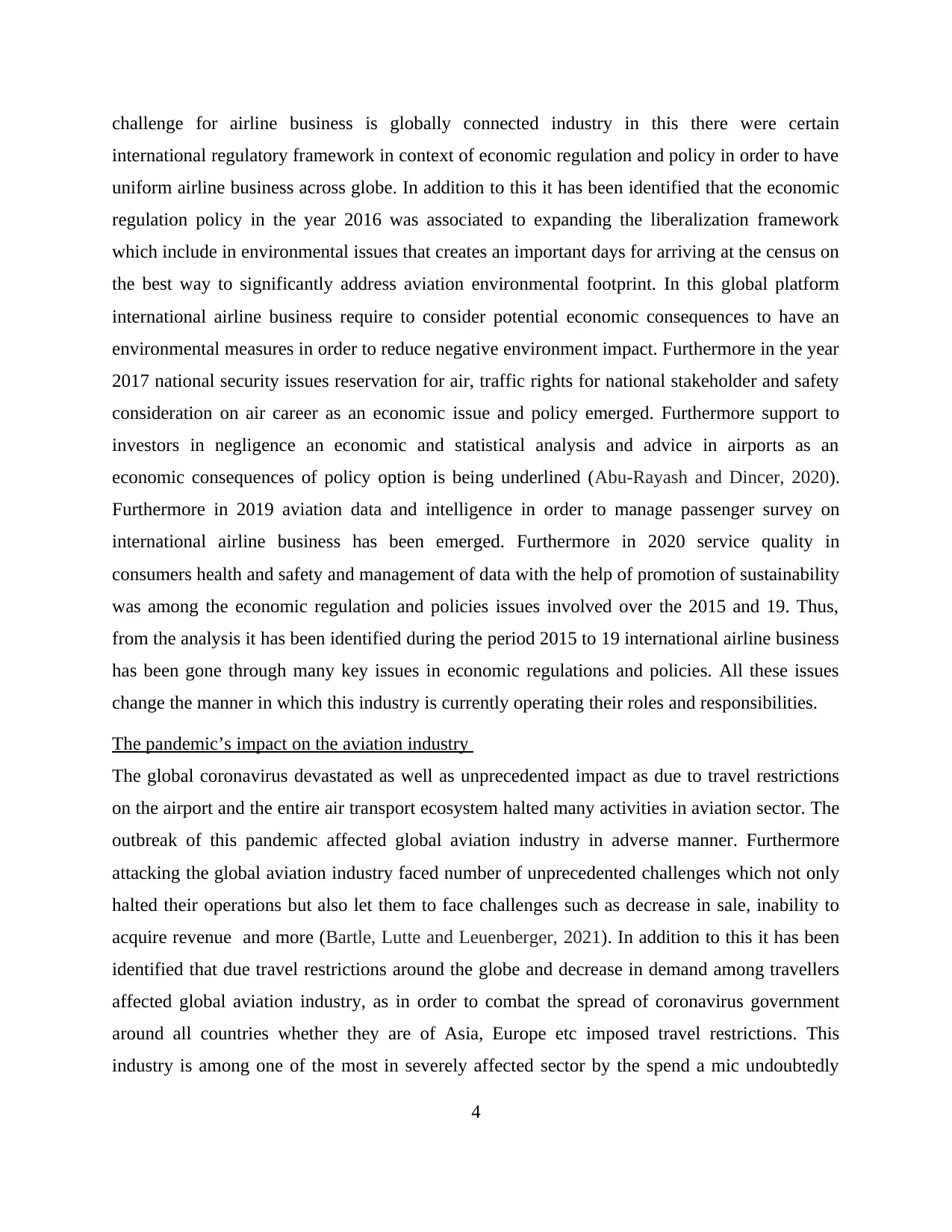
challenge for airline business is globally connected industry in this there were certain
international regulatory framework in context of economic regulation and policy in order to have
uniform airline business across globe. In addition to this it has been identified that the economic
regulation policy in the year 2016 was associated to expanding the liberalization framework
which include in environmental issues that creates an important days for arriving at the census on
the best way to significantly address aviation environmental footprint. In this global platform
international airline business require to consider potential economic consequences to have an
environmental measures in order to reduce negative environment impact. Furthermore in the year
2017 national security issues reservation for air, traffic rights for national stakeholder and safety
consideration on air career as an economic issue and policy emerged. Furthermore support to
investors in negligence an economic and statistical analysis and advice in airports as an
economic consequences of policy option is being underlined (Abu-Rayash and Dincer, 2020).
Furthermore in 2019 aviation data and intelligence in order to manage passenger survey on
international airline business has been emerged. Furthermore in 2020 service quality in
consumers health and safety and management of data with the help of promotion of sustainability
was among the economic regulation and policies issues involved over the 2015 and 19. Thus,
from the analysis it has been identified during the period 2015 to 19 international airline business
has been gone through many key issues in economic regulations and policies. All these issues
change the manner in which this industry is currently operating their roles and responsibilities.
The pandemic’s impact on the aviation industry
The global coronavirus devastated as well as unprecedented impact as due to travel restrictions
on the airport and the entire air transport ecosystem halted many activities in aviation sector. The
outbreak of this pandemic affected global aviation industry in adverse manner. Furthermore
attacking the global aviation industry faced number of unprecedented challenges which not only
halted their operations but also let them to face challenges such as decrease in sale, inability to
acquire revenue and more (Bartle, Lutte and Leuenberger, 2021). In addition to this it has been
identified that due travel restrictions around the globe and decrease in demand among travellers
affected global aviation industry, as in order to combat the spread of coronavirus government
around all countries whether they are of Asia, Europe etc imposed travel restrictions. This
industry is among one of the most in severely affected sector by the spend a mic undoubtedly
4
international regulatory framework in context of economic regulation and policy in order to have
uniform airline business across globe. In addition to this it has been identified that the economic
regulation policy in the year 2016 was associated to expanding the liberalization framework
which include in environmental issues that creates an important days for arriving at the census on
the best way to significantly address aviation environmental footprint. In this global platform
international airline business require to consider potential economic consequences to have an
environmental measures in order to reduce negative environment impact. Furthermore in the year
2017 national security issues reservation for air, traffic rights for national stakeholder and safety
consideration on air career as an economic issue and policy emerged. Furthermore support to
investors in negligence an economic and statistical analysis and advice in airports as an
economic consequences of policy option is being underlined (Abu-Rayash and Dincer, 2020).
Furthermore in 2019 aviation data and intelligence in order to manage passenger survey on
international airline business has been emerged. Furthermore in 2020 service quality in
consumers health and safety and management of data with the help of promotion of sustainability
was among the economic regulation and policies issues involved over the 2015 and 19. Thus,
from the analysis it has been identified during the period 2015 to 19 international airline business
has been gone through many key issues in economic regulations and policies. All these issues
change the manner in which this industry is currently operating their roles and responsibilities.
The pandemic’s impact on the aviation industry
The global coronavirus devastated as well as unprecedented impact as due to travel restrictions
on the airport and the entire air transport ecosystem halted many activities in aviation sector. The
outbreak of this pandemic affected global aviation industry in adverse manner. Furthermore
attacking the global aviation industry faced number of unprecedented challenges which not only
halted their operations but also let them to face challenges such as decrease in sale, inability to
acquire revenue and more (Bartle, Lutte and Leuenberger, 2021). In addition to this it has been
identified that due travel restrictions around the globe and decrease in demand among travellers
affected global aviation industry, as in order to combat the spread of coronavirus government
around all countries whether they are of Asia, Europe etc imposed travel restrictions. This
industry is among one of the most in severely affected sector by the spend a mic undoubtedly
4
Paraphrase This Document
Need a fresh take? Get an instant paraphrase of this document with our AI Paraphraser
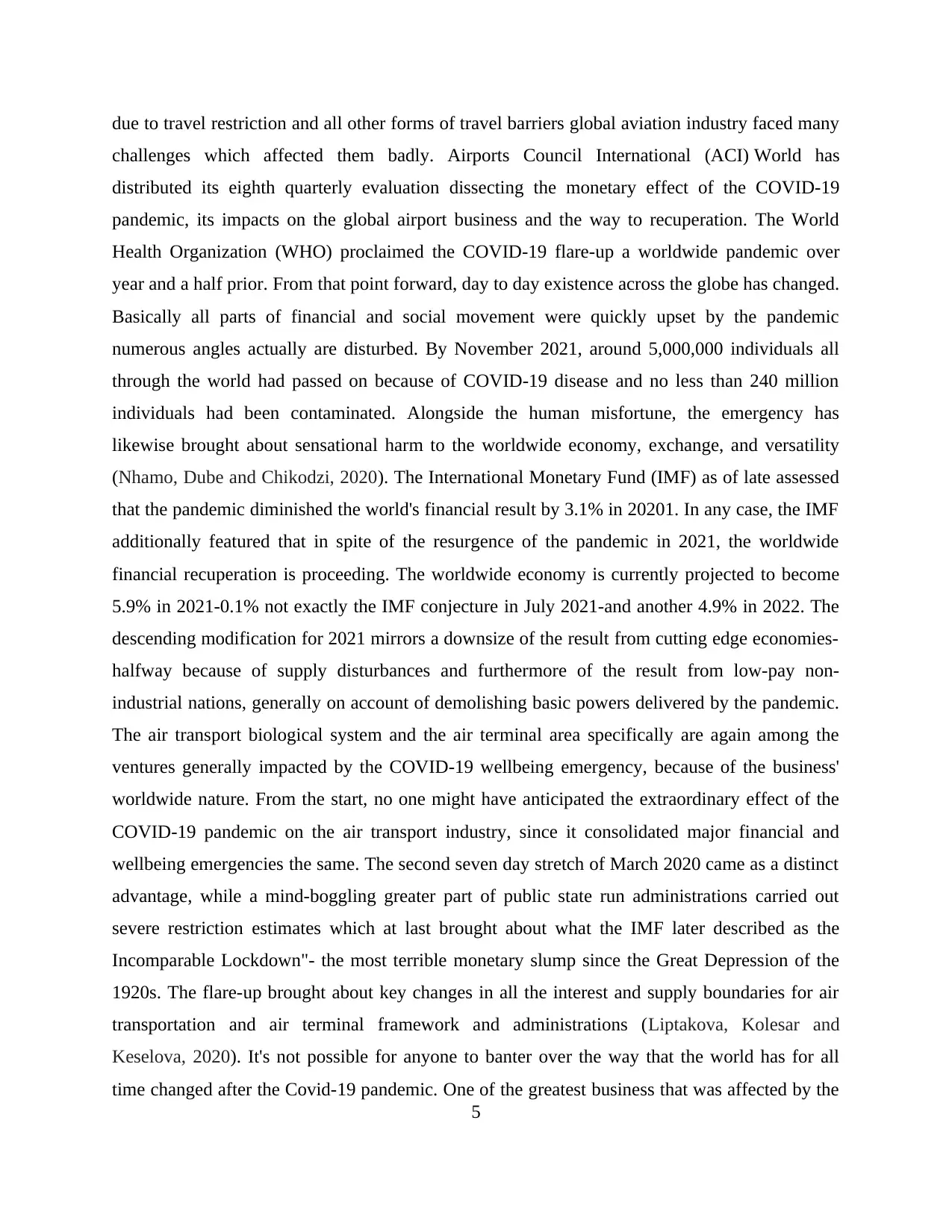
due to travel restriction and all other forms of travel barriers global aviation industry faced many
challenges which affected them badly. Airports Council International (ACI) World has
distributed its eighth quarterly evaluation dissecting the monetary effect of the COVID-19
pandemic, its impacts on the global airport business and the way to recuperation. The World
Health Organization (WHO) proclaimed the COVID-19 flare-up a worldwide pandemic over
year and a half prior. From that point forward, day to day existence across the globe has changed.
Basically all parts of financial and social movement were quickly upset by the pandemic
numerous angles actually are disturbed. By November 2021, around 5,000,000 individuals all
through the world had passed on because of COVID-19 disease and no less than 240 million
individuals had been contaminated. Alongside the human misfortune, the emergency has
likewise brought about sensational harm to the worldwide economy, exchange, and versatility
(Nhamo, Dube and Chikodzi, 2020). The International Monetary Fund (IMF) as of late assessed
that the pandemic diminished the world's financial result by 3.1% in 20201. In any case, the IMF
additionally featured that in spite of the resurgence of the pandemic in 2021, the worldwide
financial recuperation is proceeding. The worldwide economy is currently projected to become
5.9% in 2021-0.1% not exactly the IMF conjecture in July 2021-and another 4.9% in 2022. The
descending modification for 2021 mirrors a downsize of the result from cutting edge economies-
halfway because of supply disturbances and furthermore of the result from low-pay non-
industrial nations, generally on account of demolishing basic powers delivered by the pandemic.
The air transport biological system and the air terminal area specifically are again among the
ventures generally impacted by the COVID-19 wellbeing emergency, because of the business'
worldwide nature. From the start, no one might have anticipated the extraordinary effect of the
COVID-19 pandemic on the air transport industry, since it consolidated major financial and
wellbeing emergencies the same. The second seven day stretch of March 2020 came as a distinct
advantage, while a mind-boggling greater part of public state run administrations carried out
severe restriction estimates which at last brought about what the IMF later described as the
Incomparable Lockdown"- the most terrible monetary slump since the Great Depression of the
1920s. The flare-up brought about key changes in all the interest and supply boundaries for air
transportation and air terminal framework and administrations (Liptakova, Kolesar and
Keselova, 2020). It's not possible for anyone to banter over the way that the world has for all
time changed after the Covid-19 pandemic. One of the greatest business that was affected by the
5
challenges which affected them badly. Airports Council International (ACI) World has
distributed its eighth quarterly evaluation dissecting the monetary effect of the COVID-19
pandemic, its impacts on the global airport business and the way to recuperation. The World
Health Organization (WHO) proclaimed the COVID-19 flare-up a worldwide pandemic over
year and a half prior. From that point forward, day to day existence across the globe has changed.
Basically all parts of financial and social movement were quickly upset by the pandemic
numerous angles actually are disturbed. By November 2021, around 5,000,000 individuals all
through the world had passed on because of COVID-19 disease and no less than 240 million
individuals had been contaminated. Alongside the human misfortune, the emergency has
likewise brought about sensational harm to the worldwide economy, exchange, and versatility
(Nhamo, Dube and Chikodzi, 2020). The International Monetary Fund (IMF) as of late assessed
that the pandemic diminished the world's financial result by 3.1% in 20201. In any case, the IMF
additionally featured that in spite of the resurgence of the pandemic in 2021, the worldwide
financial recuperation is proceeding. The worldwide economy is currently projected to become
5.9% in 2021-0.1% not exactly the IMF conjecture in July 2021-and another 4.9% in 2022. The
descending modification for 2021 mirrors a downsize of the result from cutting edge economies-
halfway because of supply disturbances and furthermore of the result from low-pay non-
industrial nations, generally on account of demolishing basic powers delivered by the pandemic.
The air transport biological system and the air terminal area specifically are again among the
ventures generally impacted by the COVID-19 wellbeing emergency, because of the business'
worldwide nature. From the start, no one might have anticipated the extraordinary effect of the
COVID-19 pandemic on the air transport industry, since it consolidated major financial and
wellbeing emergencies the same. The second seven day stretch of March 2020 came as a distinct
advantage, while a mind-boggling greater part of public state run administrations carried out
severe restriction estimates which at last brought about what the IMF later described as the
Incomparable Lockdown"- the most terrible monetary slump since the Great Depression of the
1920s. The flare-up brought about key changes in all the interest and supply boundaries for air
transportation and air terminal framework and administrations (Liptakova, Kolesar and
Keselova, 2020). It's not possible for anyone to banter over the way that the world has for all
time changed after the Covid-19 pandemic. One of the greatest business that was affected by the
5
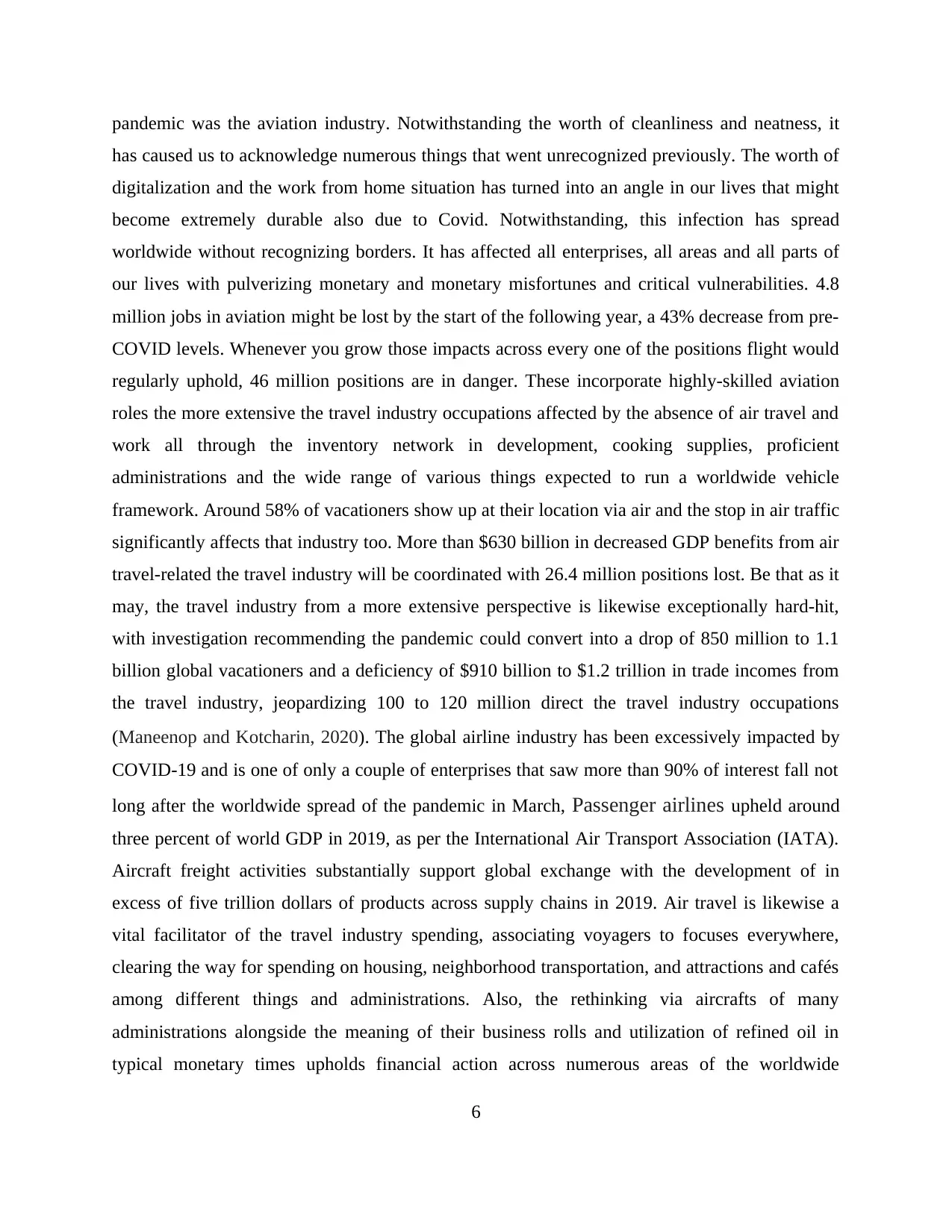
pandemic was the aviation industry. Notwithstanding the worth of cleanliness and neatness, it
has caused us to acknowledge numerous things that went unrecognized previously. The worth of
digitalization and the work from home situation has turned into an angle in our lives that might
become extremely durable also due to Covid. Notwithstanding, this infection has spread
worldwide without recognizing borders. It has affected all enterprises, all areas and all parts of
our lives with pulverizing monetary and monetary misfortunes and critical vulnerabilities. 4.8
million jobs in aviation might be lost by the start of the following year, a 43% decrease from pre-
COVID levels. Whenever you grow those impacts across every one of the positions flight would
regularly uphold, 46 million positions are in danger. These incorporate highly-skilled aviation
roles the more extensive the travel industry occupations affected by the absence of air travel and
work all through the inventory network in development, cooking supplies, proficient
administrations and the wide range of various things expected to run a worldwide vehicle
framework. Around 58% of vacationers show up at their location via air and the stop in air traffic
significantly affects that industry too. More than $630 billion in decreased GDP benefits from air
travel-related the travel industry will be coordinated with 26.4 million positions lost. Be that as it
may, the travel industry from a more extensive perspective is likewise exceptionally hard-hit,
with investigation recommending the pandemic could convert into a drop of 850 million to 1.1
billion global vacationers and a deficiency of $910 billion to $1.2 trillion in trade incomes from
the travel industry, jeopardizing 100 to 120 million direct the travel industry occupations
(Maneenop and Kotcharin, 2020). The global airline industry has been excessively impacted by
COVID-19 and is one of only a couple of enterprises that saw more than 90% of interest fall not
long after the worldwide spread of the pandemic in March, Passenger airlines upheld around
three percent of world GDP in 2019, as per the International Air Transport Association (IATA).
Aircraft freight activities substantially support global exchange with the development of in
excess of five trillion dollars of products across supply chains in 2019. Air travel is likewise a
vital facilitator of the travel industry spending, associating voyagers to focuses everywhere,
clearing the way for spending on housing, neighborhood transportation, and attractions and cafés
among different things and administrations. Also, the rethinking via aircrafts of many
administrations alongside the meaning of their business rolls and utilization of refined oil in
typical monetary times upholds financial action across numerous areas of the worldwide
6
has caused us to acknowledge numerous things that went unrecognized previously. The worth of
digitalization and the work from home situation has turned into an angle in our lives that might
become extremely durable also due to Covid. Notwithstanding, this infection has spread
worldwide without recognizing borders. It has affected all enterprises, all areas and all parts of
our lives with pulverizing monetary and monetary misfortunes and critical vulnerabilities. 4.8
million jobs in aviation might be lost by the start of the following year, a 43% decrease from pre-
COVID levels. Whenever you grow those impacts across every one of the positions flight would
regularly uphold, 46 million positions are in danger. These incorporate highly-skilled aviation
roles the more extensive the travel industry occupations affected by the absence of air travel and
work all through the inventory network in development, cooking supplies, proficient
administrations and the wide range of various things expected to run a worldwide vehicle
framework. Around 58% of vacationers show up at their location via air and the stop in air traffic
significantly affects that industry too. More than $630 billion in decreased GDP benefits from air
travel-related the travel industry will be coordinated with 26.4 million positions lost. Be that as it
may, the travel industry from a more extensive perspective is likewise exceptionally hard-hit,
with investigation recommending the pandemic could convert into a drop of 850 million to 1.1
billion global vacationers and a deficiency of $910 billion to $1.2 trillion in trade incomes from
the travel industry, jeopardizing 100 to 120 million direct the travel industry occupations
(Maneenop and Kotcharin, 2020). The global airline industry has been excessively impacted by
COVID-19 and is one of only a couple of enterprises that saw more than 90% of interest fall not
long after the worldwide spread of the pandemic in March, Passenger airlines upheld around
three percent of world GDP in 2019, as per the International Air Transport Association (IATA).
Aircraft freight activities substantially support global exchange with the development of in
excess of five trillion dollars of products across supply chains in 2019. Air travel is likewise a
vital facilitator of the travel industry spending, associating voyagers to focuses everywhere,
clearing the way for spending on housing, neighborhood transportation, and attractions and cafés
among different things and administrations. Also, the rethinking via aircrafts of many
administrations alongside the meaning of their business rolls and utilization of refined oil in
typical monetary times upholds financial action across numerous areas of the worldwide
6
⊘ This is a preview!⊘
Do you want full access?
Subscribe today to unlock all pages.

Trusted by 1+ million students worldwide
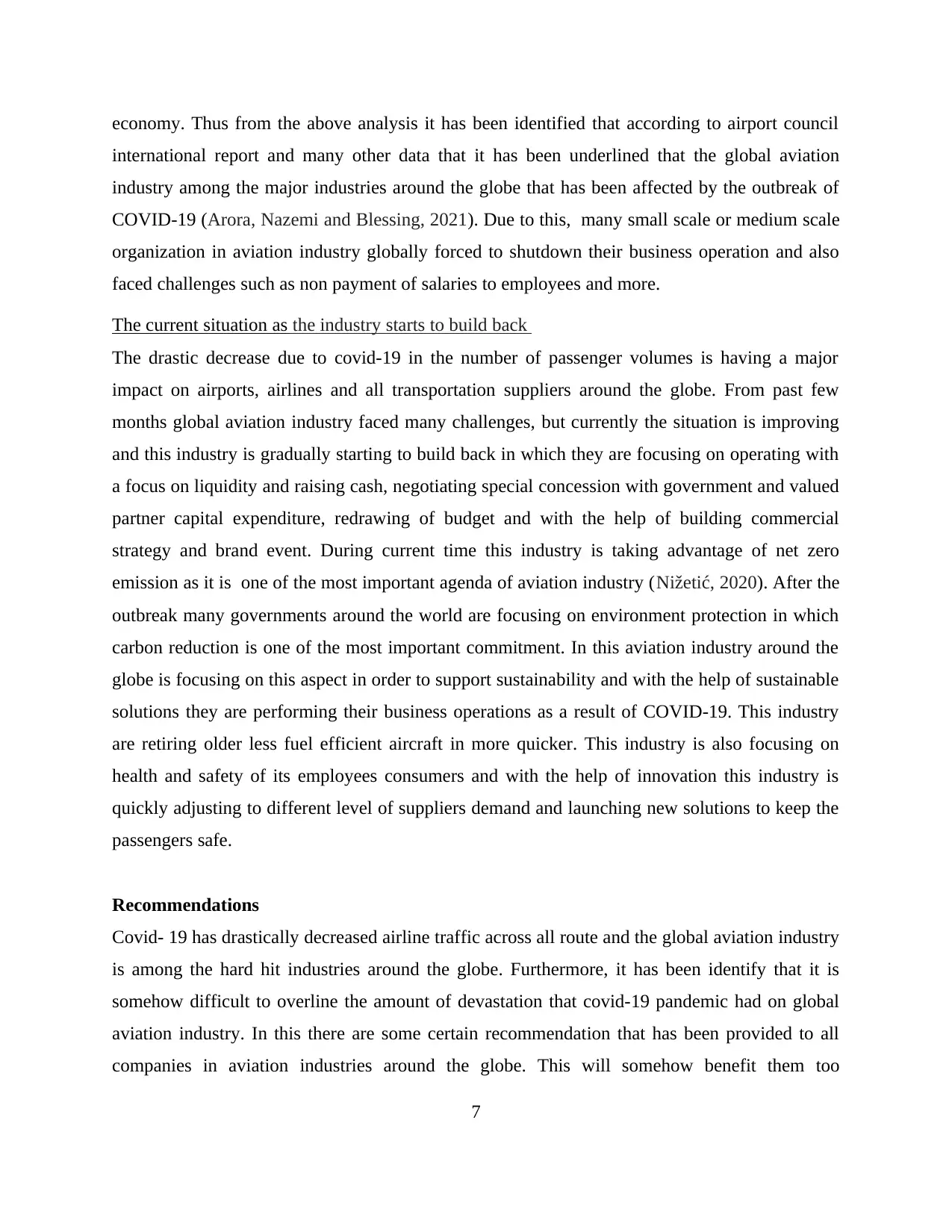
economy. Thus from the above analysis it has been identified that according to airport council
international report and many other data that it has been underlined that the global aviation
industry among the major industries around the globe that has been affected by the outbreak of
COVID-19 (Arora, Nazemi and Blessing, 2021). Due to this, many small scale or medium scale
organization in aviation industry globally forced to shutdown their business operation and also
faced challenges such as non payment of salaries to employees and more.
The current situation as the industry starts to build back
The drastic decrease due to covid-19 in the number of passenger volumes is having a major
impact on airports, airlines and all transportation suppliers around the globe. From past few
months global aviation industry faced many challenges, but currently the situation is improving
and this industry is gradually starting to build back in which they are focusing on operating with
a focus on liquidity and raising cash, negotiating special concession with government and valued
partner capital expenditure, redrawing of budget and with the help of building commercial
strategy and brand event. During current time this industry is taking advantage of net zero
emission as it is one of the most important agenda of aviation industry (Nižetić, 2020). After the
outbreak many governments around the world are focusing on environment protection in which
carbon reduction is one of the most important commitment. In this aviation industry around the
globe is focusing on this aspect in order to support sustainability and with the help of sustainable
solutions they are performing their business operations as a result of COVID-19. This industry
are retiring older less fuel efficient aircraft in more quicker. This industry is also focusing on
health and safety of its employees consumers and with the help of innovation this industry is
quickly adjusting to different level of suppliers demand and launching new solutions to keep the
passengers safe.
Recommendations
Covid- 19 has drastically decreased airline traffic across all route and the global aviation industry
is among the hard hit industries around the globe. Furthermore, it has been identify that it is
somehow difficult to overline the amount of devastation that covid-19 pandemic had on global
aviation industry. In this there are some certain recommendation that has been provided to all
companies in aviation industries around the globe. This will somehow benefit them too
7
international report and many other data that it has been underlined that the global aviation
industry among the major industries around the globe that has been affected by the outbreak of
COVID-19 (Arora, Nazemi and Blessing, 2021). Due to this, many small scale or medium scale
organization in aviation industry globally forced to shutdown their business operation and also
faced challenges such as non payment of salaries to employees and more.
The current situation as the industry starts to build back
The drastic decrease due to covid-19 in the number of passenger volumes is having a major
impact on airports, airlines and all transportation suppliers around the globe. From past few
months global aviation industry faced many challenges, but currently the situation is improving
and this industry is gradually starting to build back in which they are focusing on operating with
a focus on liquidity and raising cash, negotiating special concession with government and valued
partner capital expenditure, redrawing of budget and with the help of building commercial
strategy and brand event. During current time this industry is taking advantage of net zero
emission as it is one of the most important agenda of aviation industry (Nižetić, 2020). After the
outbreak many governments around the world are focusing on environment protection in which
carbon reduction is one of the most important commitment. In this aviation industry around the
globe is focusing on this aspect in order to support sustainability and with the help of sustainable
solutions they are performing their business operations as a result of COVID-19. This industry
are retiring older less fuel efficient aircraft in more quicker. This industry is also focusing on
health and safety of its employees consumers and with the help of innovation this industry is
quickly adjusting to different level of suppliers demand and launching new solutions to keep the
passengers safe.
Recommendations
Covid- 19 has drastically decreased airline traffic across all route and the global aviation industry
is among the hard hit industries around the globe. Furthermore, it has been identify that it is
somehow difficult to overline the amount of devastation that covid-19 pandemic had on global
aviation industry. In this there are some certain recommendation that has been provided to all
companies in aviation industries around the globe. This will somehow benefit them too
7
Paraphrase This Document
Need a fresh take? Get an instant paraphrase of this document with our AI Paraphraser
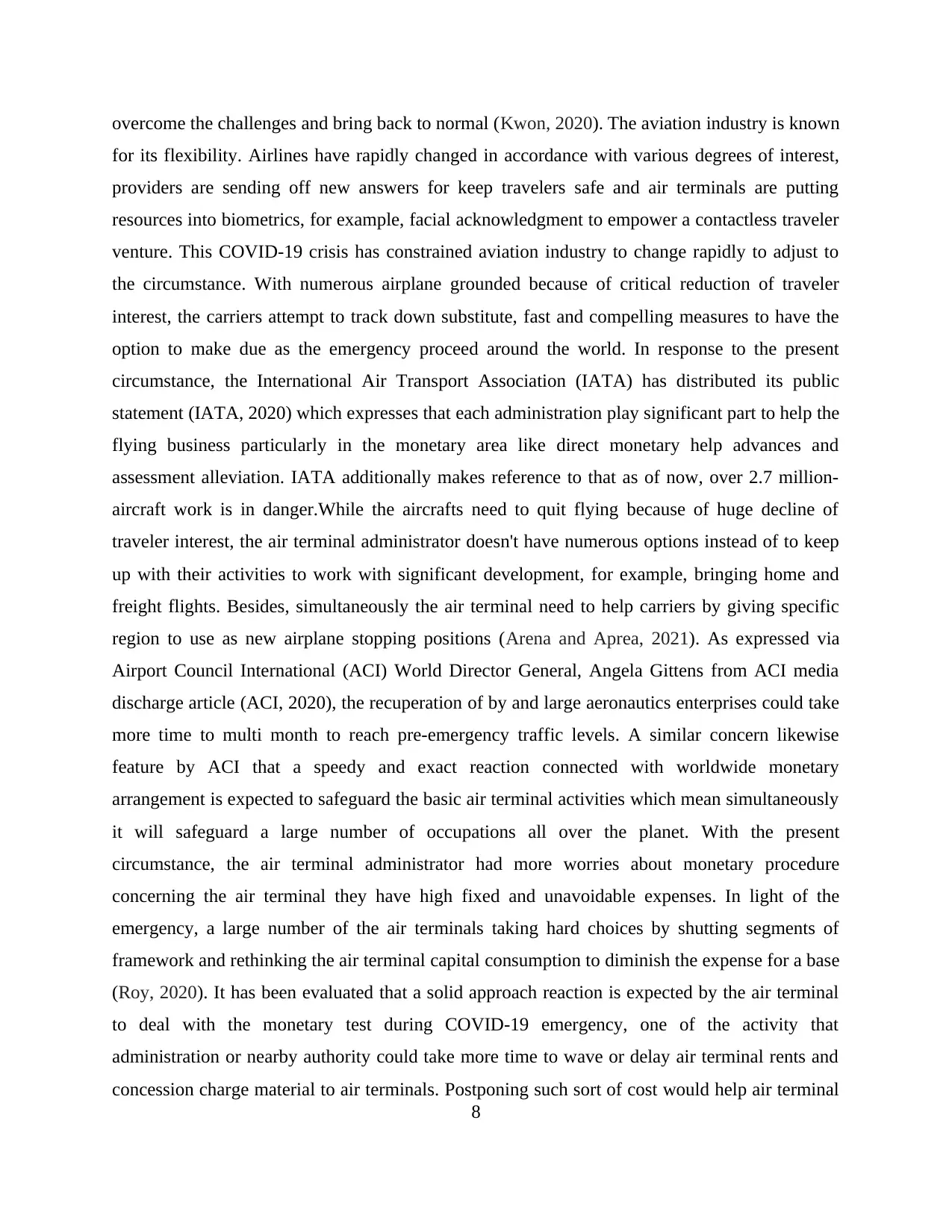
overcome the challenges and bring back to normal (Kwon, 2020). The aviation industry is known
for its flexibility. Airlines have rapidly changed in accordance with various degrees of interest,
providers are sending off new answers for keep travelers safe and air terminals are putting
resources into biometrics, for example, facial acknowledgment to empower a contactless traveler
venture. This COVID-19 crisis has constrained aviation industry to change rapidly to adjust to
the circumstance. With numerous airplane grounded because of critical reduction of traveler
interest, the carriers attempt to track down substitute, fast and compelling measures to have the
option to make due as the emergency proceed around the world. In response to the present
circumstance, the International Air Transport Association (IATA) has distributed its public
statement (IATA, 2020) which expresses that each administration play significant part to help the
flying business particularly in the monetary area like direct monetary help advances and
assessment alleviation. IATA additionally makes reference to that as of now, over 2.7 million-
aircraft work is in danger.While the aircrafts need to quit flying because of huge decline of
traveler interest, the air terminal administrator doesn't have numerous options instead of to keep
up with their activities to work with significant development, for example, bringing home and
freight flights. Besides, simultaneously the air terminal need to help carriers by giving specific
region to use as new airplane stopping positions (Arena and Aprea, 2021). As expressed via
Airport Council International (ACI) World Director General, Angela Gittens from ACI media
discharge article (ACI, 2020), the recuperation of by and large aeronautics enterprises could take
more time to multi month to reach pre-emergency traffic levels. A similar concern likewise
feature by ACI that a speedy and exact reaction connected with worldwide monetary
arrangement is expected to safeguard the basic air terminal activities which mean simultaneously
it will safeguard a large number of occupations all over the planet. With the present
circumstance, the air terminal administrator had more worries about monetary procedure
concerning the air terminal they have high fixed and unavoidable expenses. In light of the
emergency, a large number of the air terminals taking hard choices by shutting segments of
framework and rethinking the air terminal capital consumption to diminish the expense for a base
(Roy, 2020). It has been evaluated that a solid approach reaction is expected by the air terminal
to deal with the monetary test during COVID-19 emergency, one of the activity that
administration or nearby authority could take more time to wave or delay air terminal rents and
concession charge material to air terminals. Postponing such sort of cost would help air terminal
8
for its flexibility. Airlines have rapidly changed in accordance with various degrees of interest,
providers are sending off new answers for keep travelers safe and air terminals are putting
resources into biometrics, for example, facial acknowledgment to empower a contactless traveler
venture. This COVID-19 crisis has constrained aviation industry to change rapidly to adjust to
the circumstance. With numerous airplane grounded because of critical reduction of traveler
interest, the carriers attempt to track down substitute, fast and compelling measures to have the
option to make due as the emergency proceed around the world. In response to the present
circumstance, the International Air Transport Association (IATA) has distributed its public
statement (IATA, 2020) which expresses that each administration play significant part to help the
flying business particularly in the monetary area like direct monetary help advances and
assessment alleviation. IATA additionally makes reference to that as of now, over 2.7 million-
aircraft work is in danger.While the aircrafts need to quit flying because of huge decline of
traveler interest, the air terminal administrator doesn't have numerous options instead of to keep
up with their activities to work with significant development, for example, bringing home and
freight flights. Besides, simultaneously the air terminal need to help carriers by giving specific
region to use as new airplane stopping positions (Arena and Aprea, 2021). As expressed via
Airport Council International (ACI) World Director General, Angela Gittens from ACI media
discharge article (ACI, 2020), the recuperation of by and large aeronautics enterprises could take
more time to multi month to reach pre-emergency traffic levels. A similar concern likewise
feature by ACI that a speedy and exact reaction connected with worldwide monetary
arrangement is expected to safeguard the basic air terminal activities which mean simultaneously
it will safeguard a large number of occupations all over the planet. With the present
circumstance, the air terminal administrator had more worries about monetary procedure
concerning the air terminal they have high fixed and unavoidable expenses. In light of the
emergency, a large number of the air terminals taking hard choices by shutting segments of
framework and rethinking the air terminal capital consumption to diminish the expense for a base
(Roy, 2020). It has been evaluated that a solid approach reaction is expected by the air terminal
to deal with the monetary test during COVID-19 emergency, one of the activity that
administration or nearby authority could take more time to wave or delay air terminal rents and
concession charge material to air terminals. Postponing such sort of cost would help air terminal
8
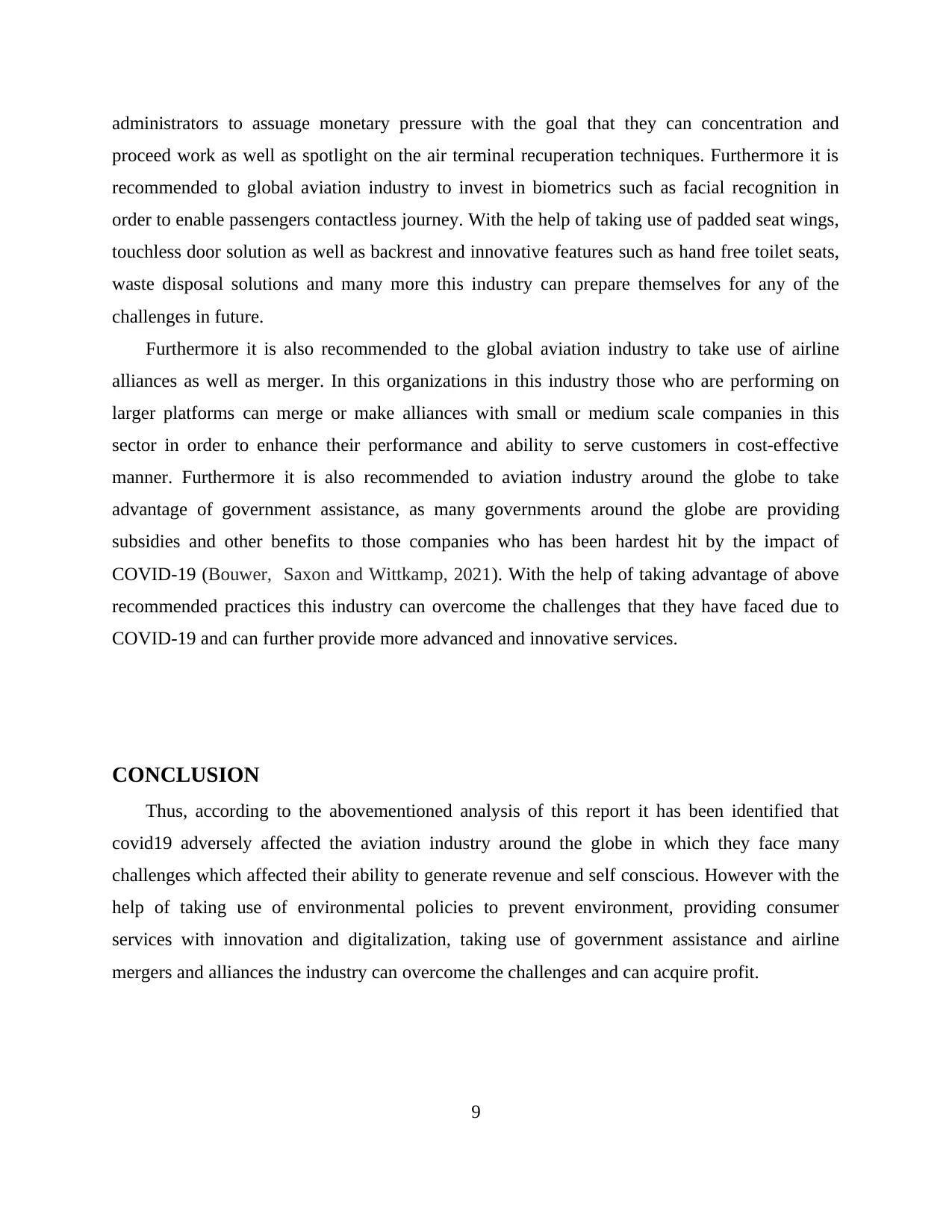
administrators to assuage monetary pressure with the goal that they can concentration and
proceed work as well as spotlight on the air terminal recuperation techniques. Furthermore it is
recommended to global aviation industry to invest in biometrics such as facial recognition in
order to enable passengers contactless journey. With the help of taking use of padded seat wings,
touchless door solution as well as backrest and innovative features such as hand free toilet seats,
waste disposal solutions and many more this industry can prepare themselves for any of the
challenges in future.
Furthermore it is also recommended to the global aviation industry to take use of airline
alliances as well as merger. In this organizations in this industry those who are performing on
larger platforms can merge or make alliances with small or medium scale companies in this
sector in order to enhance their performance and ability to serve customers in cost-effective
manner. Furthermore it is also recommended to aviation industry around the globe to take
advantage of government assistance, as many governments around the globe are providing
subsidies and other benefits to those companies who has been hardest hit by the impact of
COVID-19 (Bouwer, Saxon and Wittkamp, 2021). With the help of taking advantage of above
recommended practices this industry can overcome the challenges that they have faced due to
COVID-19 and can further provide more advanced and innovative services.
CONCLUSION
Thus, according to the abovementioned analysis of this report it has been identified that
covid19 adversely affected the aviation industry around the globe in which they face many
challenges which affected their ability to generate revenue and self conscious. However with the
help of taking use of environmental policies to prevent environment, providing consumer
services with innovation and digitalization, taking use of government assistance and airline
mergers and alliances the industry can overcome the challenges and can acquire profit.
9
proceed work as well as spotlight on the air terminal recuperation techniques. Furthermore it is
recommended to global aviation industry to invest in biometrics such as facial recognition in
order to enable passengers contactless journey. With the help of taking use of padded seat wings,
touchless door solution as well as backrest and innovative features such as hand free toilet seats,
waste disposal solutions and many more this industry can prepare themselves for any of the
challenges in future.
Furthermore it is also recommended to the global aviation industry to take use of airline
alliances as well as merger. In this organizations in this industry those who are performing on
larger platforms can merge or make alliances with small or medium scale companies in this
sector in order to enhance their performance and ability to serve customers in cost-effective
manner. Furthermore it is also recommended to aviation industry around the globe to take
advantage of government assistance, as many governments around the globe are providing
subsidies and other benefits to those companies who has been hardest hit by the impact of
COVID-19 (Bouwer, Saxon and Wittkamp, 2021). With the help of taking advantage of above
recommended practices this industry can overcome the challenges that they have faced due to
COVID-19 and can further provide more advanced and innovative services.
CONCLUSION
Thus, according to the abovementioned analysis of this report it has been identified that
covid19 adversely affected the aviation industry around the globe in which they face many
challenges which affected their ability to generate revenue and self conscious. However with the
help of taking use of environmental policies to prevent environment, providing consumer
services with innovation and digitalization, taking use of government assistance and airline
mergers and alliances the industry can overcome the challenges and can acquire profit.
9
⊘ This is a preview!⊘
Do you want full access?
Subscribe today to unlock all pages.

Trusted by 1+ million students worldwide
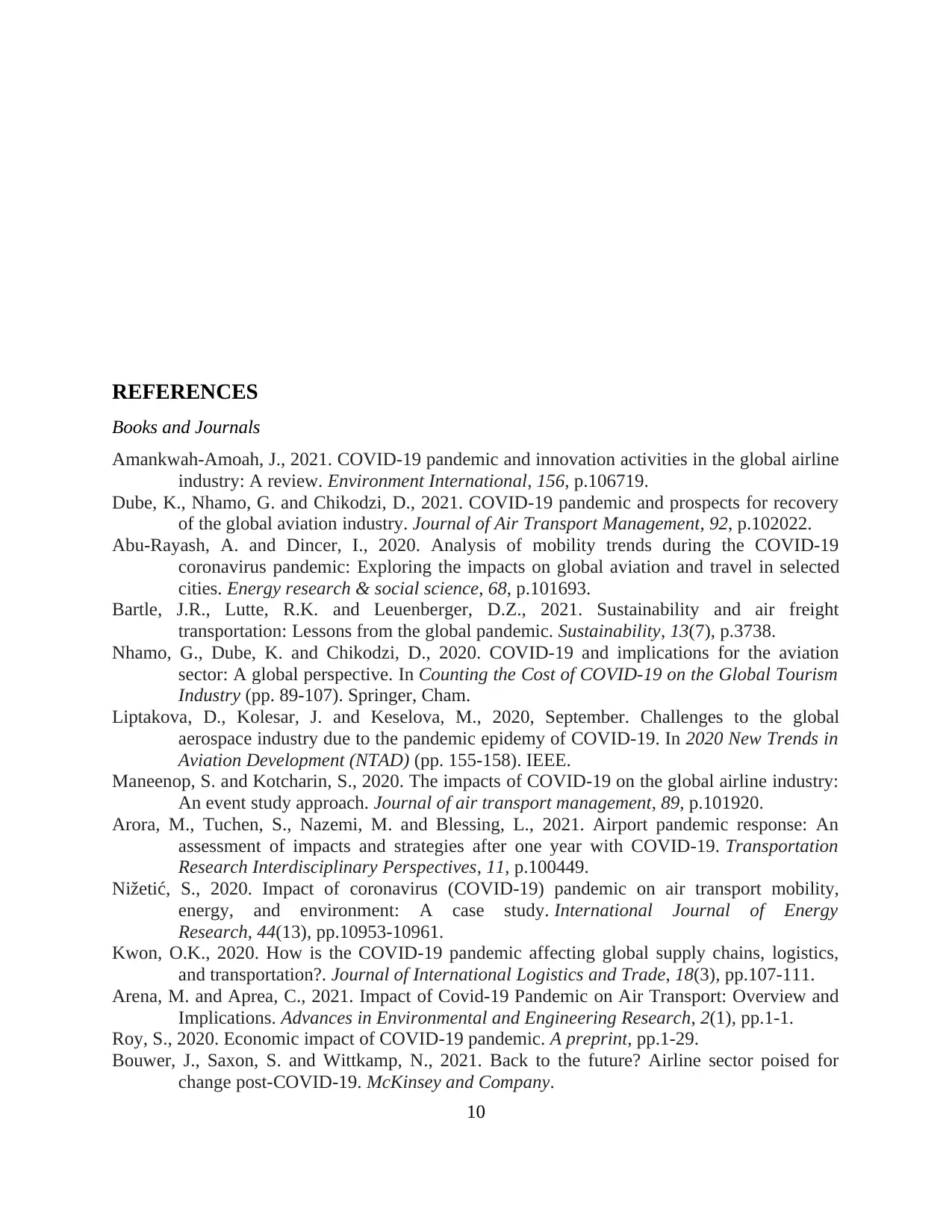
REFERENCES
Books and Journals
Amankwah-Amoah, J., 2021. COVID‐19 pandemic and innovation activities in the global airline
industry: A review. Environment International, 156, p.106719.
Dube, K., Nhamo, G. and Chikodzi, D., 2021. COVID-19 pandemic and prospects for recovery
of the global aviation industry. Journal of Air Transport Management, 92, p.102022.
Abu-Rayash, A. and Dincer, I., 2020. Analysis of mobility trends during the COVID-19
coronavirus pandemic: Exploring the impacts on global aviation and travel in selected
cities. Energy research & social science, 68, p.101693.
Bartle, J.R., Lutte, R.K. and Leuenberger, D.Z., 2021. Sustainability and air freight
transportation: Lessons from the global pandemic. Sustainability, 13(7), p.3738.
Nhamo, G., Dube, K. and Chikodzi, D., 2020. COVID-19 and implications for the aviation
sector: A global perspective. In Counting the Cost of COVID-19 on the Global Tourism
Industry (pp. 89-107). Springer, Cham.
Liptakova, D., Kolesar, J. and Keselova, M., 2020, September. Challenges to the global
aerospace industry due to the pandemic epidemy of COVID-19. In 2020 New Trends in
Aviation Development (NTAD) (pp. 155-158). IEEE.
Maneenop, S. and Kotcharin, S., 2020. The impacts of COVID-19 on the global airline industry:
An event study approach. Journal of air transport management, 89, p.101920.
Arora, M., Tuchen, S., Nazemi, M. and Blessing, L., 2021. Airport pandemic response: An
assessment of impacts and strategies after one year with COVID-19. Transportation
Research Interdisciplinary Perspectives, 11, p.100449.
Nižetić, S., 2020. Impact of coronavirus (COVID‐19) pandemic on air transport mobility,
energy, and environment: A case study. International Journal of Energy
Research, 44(13), pp.10953-10961.
Kwon, O.K., 2020. How is the COVID-19 pandemic affecting global supply chains, logistics,
and transportation?. Journal of International Logistics and Trade, 18(3), pp.107-111.
Arena, M. and Aprea, C., 2021. Impact of Covid-19 Pandemic on Air Transport: Overview and
Implications. Advances in Environmental and Engineering Research, 2(1), pp.1-1.
Roy, S., 2020. Economic impact of COVID-19 pandemic. A preprint, pp.1-29.
Bouwer, J., Saxon, S. and Wittkamp, N., 2021. Back to the future? Airline sector poised for
change post-COVID-19. McKinsey and Company.
10
Books and Journals
Amankwah-Amoah, J., 2021. COVID‐19 pandemic and innovation activities in the global airline
industry: A review. Environment International, 156, p.106719.
Dube, K., Nhamo, G. and Chikodzi, D., 2021. COVID-19 pandemic and prospects for recovery
of the global aviation industry. Journal of Air Transport Management, 92, p.102022.
Abu-Rayash, A. and Dincer, I., 2020. Analysis of mobility trends during the COVID-19
coronavirus pandemic: Exploring the impacts on global aviation and travel in selected
cities. Energy research & social science, 68, p.101693.
Bartle, J.R., Lutte, R.K. and Leuenberger, D.Z., 2021. Sustainability and air freight
transportation: Lessons from the global pandemic. Sustainability, 13(7), p.3738.
Nhamo, G., Dube, K. and Chikodzi, D., 2020. COVID-19 and implications for the aviation
sector: A global perspective. In Counting the Cost of COVID-19 on the Global Tourism
Industry (pp. 89-107). Springer, Cham.
Liptakova, D., Kolesar, J. and Keselova, M., 2020, September. Challenges to the global
aerospace industry due to the pandemic epidemy of COVID-19. In 2020 New Trends in
Aviation Development (NTAD) (pp. 155-158). IEEE.
Maneenop, S. and Kotcharin, S., 2020. The impacts of COVID-19 on the global airline industry:
An event study approach. Journal of air transport management, 89, p.101920.
Arora, M., Tuchen, S., Nazemi, M. and Blessing, L., 2021. Airport pandemic response: An
assessment of impacts and strategies after one year with COVID-19. Transportation
Research Interdisciplinary Perspectives, 11, p.100449.
Nižetić, S., 2020. Impact of coronavirus (COVID‐19) pandemic on air transport mobility,
energy, and environment: A case study. International Journal of Energy
Research, 44(13), pp.10953-10961.
Kwon, O.K., 2020. How is the COVID-19 pandemic affecting global supply chains, logistics,
and transportation?. Journal of International Logistics and Trade, 18(3), pp.107-111.
Arena, M. and Aprea, C., 2021. Impact of Covid-19 Pandemic on Air Transport: Overview and
Implications. Advances in Environmental and Engineering Research, 2(1), pp.1-1.
Roy, S., 2020. Economic impact of COVID-19 pandemic. A preprint, pp.1-29.
Bouwer, J., Saxon, S. and Wittkamp, N., 2021. Back to the future? Airline sector poised for
change post-COVID-19. McKinsey and Company.
10
1 out of 10
Related Documents
Your All-in-One AI-Powered Toolkit for Academic Success.
+13062052269
info@desklib.com
Available 24*7 on WhatsApp / Email
![[object Object]](/_next/static/media/star-bottom.7253800d.svg)
Unlock your academic potential
Copyright © 2020–2026 A2Z Services. All Rights Reserved. Developed and managed by ZUCOL.





